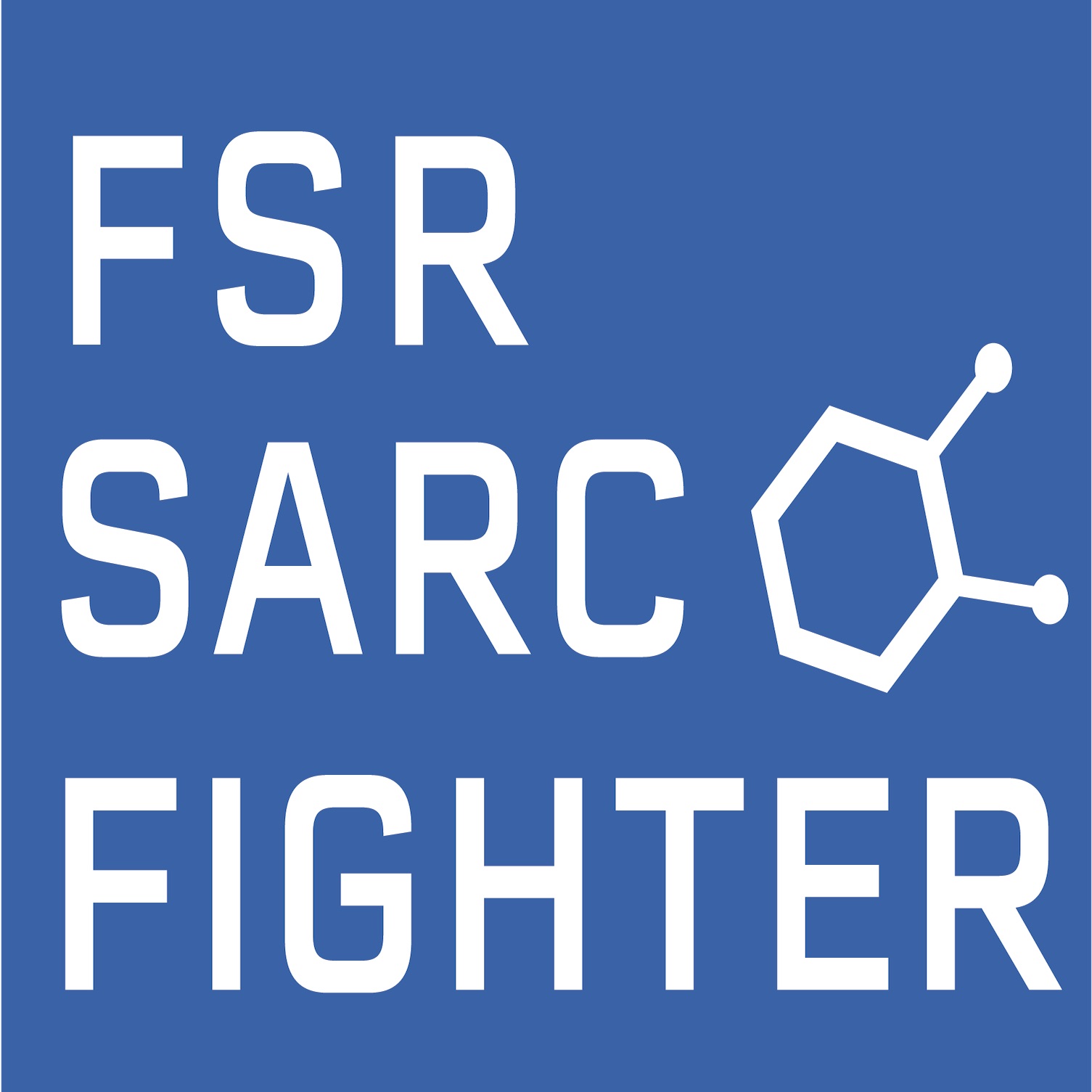
Episodes
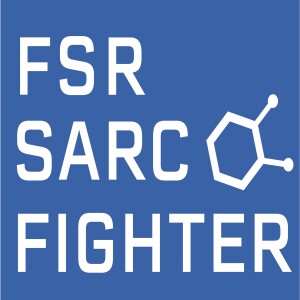
Monday May 22, 2023
Episode 88 | MaryKay Reidenbach has been fighting the fight for 28 years.
Monday May 22, 2023
Monday May 22, 2023
Sarc Fighter MaryKay Reidenbach has been fighting sarcoidosis for close to three decades. It's invaded so many parts of her body, it's hard to figure out where it's the worst. But she keeps plugging along, trying to live her best life, and largely doing so. Hear her story in this episode of the FSR Sarc Fighter Podcast.

- www.kinevant.com
- www.sarcoidosistrial.com
- Click here for information on how to sign up for the clinical trial: https://bit.ly/3DaVsR6
- ClinicalTrials.gov listing for RESOLVE-Lung: https://clinicaltrials.gov/ct2/show/NCT05314517
- ClinicalTrials.gov listing for RESOLVE-Heart: https://clinicaltrials.gov/ct2/show/NCT05351554
Attend the FSR Crystal Awards Gala: https://www.stopsarcoidosis.org/gala-2023/
Royce's Cycle4Sarc page: https://stopsarcoidosis.rallybound.org/cycle4sarc?tab=Dashboard&fbclid=PAAaa9zWEjpGVyS1Q5Swa8mm5JT0t7JH13dfxVxdW1QlBMmbiRmc00Ol-uu-c
Royce Robertsons original interview: https://beatsarc.podbean.com/e/episode-79a-royce-robertson-is-fighting-sarcoidosis-from-the-seat-of-his-bike/
Help FSR further its mission by becoming an Alliance Volunteer: www.stopsarcoidosis.org/gsca-leaders/
Become a community outreach leader: https://www.stopsarcoidosis.org/gsca-leaders/
MORE FROM JOHN
Cycling with Sarcoidosis http://carlinthecyclist.com/category/cycling-with-sarcoidosis/
Do you like the official song for the Sarc Fighter podcast? It's also an FSR fundraiser!
If you would like to donate in honor of Mark Steier and the song, Zombie, Here is a link to his KISS account. (Kick In to Stop Sarcoidosis) 100-percent of the money goes to the Foundation. https://stopsarcoidosis.rallybound.org/MarkSteier
The Foundation for Sarcoidosis Research https://www.stopsarcoidosis.org/
Donate to my KISS (Kick In to Stop Sarcoidosis) fund for FSR https://stopsarcoidosis.rallybound.org/JohnCarlinVsSarcoidosis?fbclid=IwAR1g2ap1i1NCp6bQOYEFwOELdNEeclFmmLLcQQOQX_Awub1oe9bcEjK9P1E
My story on Television https://www.stopsarcoidosis.org/news-anchor-sarcoidosis/
email me carlinagency@gmail.com
email Royce Robertson roycelrobertson@gmail.com

Monday May 08, 2023
Monday May 08, 2023
Rebecca Stanfel is a Sarc Fighter who also happens to be a wonderful writer -- to the point that national publications share her work. She recently published a blog in the Huffington Post, where she talked about the pain from Sarcoidosis that was so bad, only opioids would give her relief. In a world where we now often shudder at the mention of these addictive drugs, Stanfel wrote that they were her only path forward and that they serve a necessary purpose in certain situations -- including hers.
That is not to say it wasn't a struggle or that it was easy to wean herself from the medication. It wasn't. But in her writings, and during the discussion on the podcast she talks about how she fought to free herself from the drugs while still dealing with sarcoidosis.

Show notes:
Rebecca's post on Huffpost: https://www.huffpost.com/entry/oxycontin-fentanyl-opioid-crisis_n_63d1603de4b0c8e3fc7b72f6
More on aTyr Pharma: https://atyrpharma.com/
Participate in the aTyr Clinical Trial: https://bit.ly/3EUOxNq
Attend the FSR Crystal Awards Gala: https://www.stopsarcoidosis.org/gala-2023/
Royce's Cycle4Sarc page: https://stopsarcoidosis.rallybound.org/cycle4sarc?tab=Dashboard&fbclid=PAAaa9zWEjpGVyS1Q5Swa8mm5JT0t7JH13dfxVxdW1QlBMmbiRmc00Ol-uu-c
Royce Robertsons original interview: https://beatsarc.podbean.com/e/episode-79a-royce-robertson-is-fighting-sarcoidosis-from-the-seat-of-his-bike/
Help FSR further its mission by becoming an Alliance Volunteer: www.stopsarcoidosis.org/gsca-leaders/
Become a community outreach leader: https://www.stopsarcoidosis.org/gsca-leaders/
MORE FROM JOHN
John Carlin's Outdoors: https://www.wsls.com/topic/John_Carlin%27s_Outdoors/
Cycling with Sarcoidosis http://carlinthecyclist.com/category/cycling-with-sarcoidosis/
Do you like the official song for the Sarc Fighter podcast? It's also an FSR fundraiser!
If you would like to donate in honor of Mark Steier and the song, Zombie, Here is a link to his KISS account. (Kick In to Stop Sarcoidosis) 100-percent of the money goes to the Foundation. https://stopsarcoidosis.rallybound.org/MarkSteier
The Foundation for Sarcoidosis Research https://www.stopsarcoidosis.org/
Donate to my KISS (Kick In to Stop Sarcoidosis) fund for FSR https://stopsarcoidosis.rallybound.org/JohnCarlinVsSarcoidosis?fbclid=IwAR1g2ap1i1NCp6bQOYEFwOELdNEeclFmmLLcQQOQX_Awub1oe9bcEjK9P1E
My story on Television https://www.stopsarcoidosis.org/news-anchor-sarcoidosis/
email me carlinagency@gmail.com
email Royce Robertson roycelrobertson@gmail.com

Monday Apr 24, 2023
Monday Apr 24, 2023
Betsy Bennett is fighting Sarcoidosis. That might seem easy after breast cancer led to a double mastectomy. But now the fatigue and ongoing battle with Sarc are taking a big toll on her quality of life. Listen in as she shares the story of how she thought she was disease free for just a brief time.

Show Notes
- www.kinevant.com
- www.sarcoidosistrial.com
- Click here for information on how to sign up for the clinical trial: https://bit.ly/3DaVsR6
- ClinicalTrials.gov listing for RESOLVE-Lung: https://clinicaltrials.gov/ct2/show/NCT05314517
- ClinicalTrials.gov listing for RESOLVE-Heart: https://clinicaltrials.gov/ct2/show/NCT05351554
Betsy on Youtube: www.youtube.com/@DrBetsyB
Sarcoidosis Awareness Month Info: https://www.stopsarcoidosis.org/standupforsarc/
Attend the FSR Crystal Awards Gala: https://www.stopsarcoidosis.org/gala-2023/
Royce's Cycle4Sarc page: https://stopsarcoidosis.rallybound.org/cycle4sarc?tab=Dashboard&fbclid=PAAaa9zWEjpGVyS1Q5Swa8mm5JT0t7JH13dfxVxdW1QlBMmbiRmc00Ol-uu-c
Royce Robertsons original interview: https://beatsarc.podbean.com/e/episode-79a-royce-robertson-is-fighting-sarcoidosis-from-the-seat-of-his-bike/
Help FSR further its mission by becoming an Alliance Volunteer: www.stopsarcoidosis.org/gsca-leaders/
Become a community outreach leader: https://www.stopsarcoidosis.org/gsca-leaders/
MORE FROM JOHN
Cycling with Sarcoidosis http://carlinthecyclist.com/category/cycling-with-sarcoidosis/
Do you like the official song for the Sarc Fighter podcast? It's also an FSR fundraiser!
If you would like to donate in honor of Mark Steier and the song, Zombie, Here is a link to his KISS account. (Kick In to Stop Sarcoidosis) 100-percent of the money goes to the Foundation. https://stopsarcoidosis.rallybound.org/MarkSteier
The Foundation for Sarcoidosis Research https://www.stopsarcoidosis.org/
Donate to my KISS (Kick In to Stop Sarcoidosis) fund for FSR https://stopsarcoidosis.rallybound.org/JohnCarlinVsSarcoidosis?fbclid=IwAR1g2ap1i1NCp6bQOYEFwOELdNEeclFmmLLcQQOQX_Awub1oe9bcEjK9P1E
My story on Television https://www.stopsarcoidosis.org/news-anchor-sarcoidosis/
email me carlinagency@gmail.com
email Royce Robertson roycelrobertson@gmail.com

Monday Apr 10, 2023
Monday Apr 10, 2023
This podcast is a recording of the amazing town hall discussion looking at aTyr Pharma's drug that shows great promise as a replacement for prednisone for pulmonary sarcoidosis patients. In this discussion, we will hear from aTyr CEO Dr. Sanjay Shukla, FSR CEO Mary McGowan, Patient Jim Kuhn, and Dr. Shambhu Aryal - the Medical Director of the Inova Sarcoidosis Center. Together we look at the problems with the current therapies available to the sarcoidosis community, the frustration felt by both patients and physicians, and the promise of a drug called efzofitimod, which is now in Stage three clinical trials.
This is a compelling discussion where, once again, thanks to the team at the Foundation for Sarcoidosis Research, all the key players are available and more than willing to share their portion of the story and all it takes to move the needle on research.
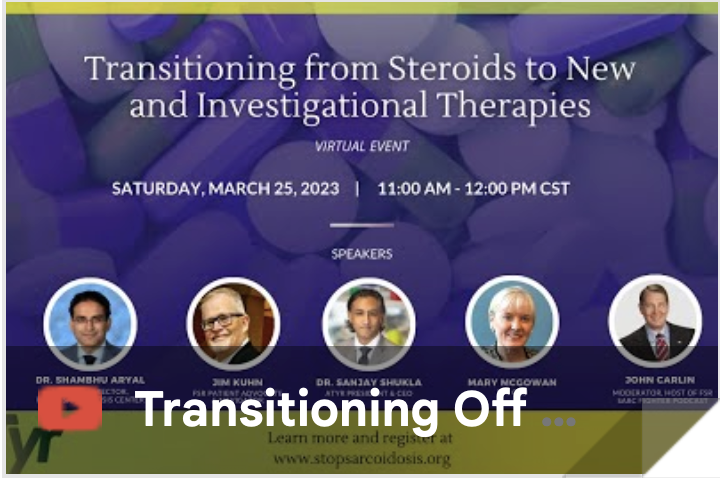
Show notes:
Watch the Town Hall on You tube: https://youtu.be/mAXK1Ij8SgU
Sarcoidosis Awareness Month Info: https://www.stopsarcoidosis.org/standupforsarc/
More on aTyr Pharma: https://atyrpharma.com/
Participate in the aTyr Clinical Trial: https://bit.ly/3EUOxNq
aTyr News Release: https://investors.atyrpharma.com/news-releases/news-release-details/atyr-pharma-announces-dosing-first-patient-pivotal-phase-3-efzo
Attend the FSR Crystal Awards Gala: https://www.stopsarcoidosis.org/gala-2023/
Royce's Cycle4Sarc page: https://stopsarcoidosis.rallybound.org/cycle4sarc?tab=Dashboard&fbclid=PAAaa9zWEjpGVyS1Q5Swa8mm5JT0t7JH13dfxVxdW1QlBMmbiRmc00Ol-uu-c
Royce Robertsons original interview: https://beatsarc.podbean.com/e/episode-79a-royce-robertson-is-fighting-sarcoidosis-from-the-seat-of-his-bike/
Help FSR further its mission by becoming an Alliance Volunteer: www.stopsarcoidosis.org/gsca-leaders/
Become a community outreach leader: https://www.stopsarcoidosis.org/gsca-leaders/
MORE FROM JOHN
Cycling with Sarcoidosis http://carlinthecyclist.com/category/cycling-with-sarcoidosis/
Do you like the official song for the Sarc Fighter podcast? It's also an FSR fundraiser!
If you would like to donate in honor of Mark Steier and the song, Zombie, Here is a link to his KISS account. (Kick In to Stop Sarcoidosis) 100-percent of the money goes to the Foundation. https://stopsarcoidosis.rallybound.org/MarkSteier
The Foundation for Sarcoidosis Research https://www.stopsarcoidosis.org/
Donate to my KISS (Kick In to Stop Sarcoidosis) fund for FSR https://stopsarcoidosis.rallybound.org/JohnCarlinVsSarcoidosis?fbclid=IwAR1g2ap1i1NCp6bQOYEFwOELdNEeclFmmLLcQQOQX_Awub1oe9bcEjK9P1E
My story on Television https://www.stopsarcoidosis.org/news-anchor-sarcoidosis/
email me carlinagency@gmail.com
email Royce Robertson roycelrobertson@gmail.com

Monday Apr 03, 2023
Monday Apr 03, 2023
April is Sarcoidosis Awareness month and FSR has many ways that the community can participate -- with your photos, videos and even holding up signs. It's all part of making the world aware that Sarcoidosis is a problem -- and remember the squeaky wheel gets the grease. Well it's time to squeak! Joining me on the FSR Sarc Fighter podcast this week are FSR Director of Development Angela O'Malley, Senior communications and Marketing Director Cathi Davis, and FSR Board Member and sarc patient Craig Lipset. Hear Craig's story about how sarcoidosis slowed his life as a young executive, and how he made his way to a leadership position with FSR -- and more importantly, how FSR is making it possible and even probable that more companies will try to find new drugs to fight the disease.
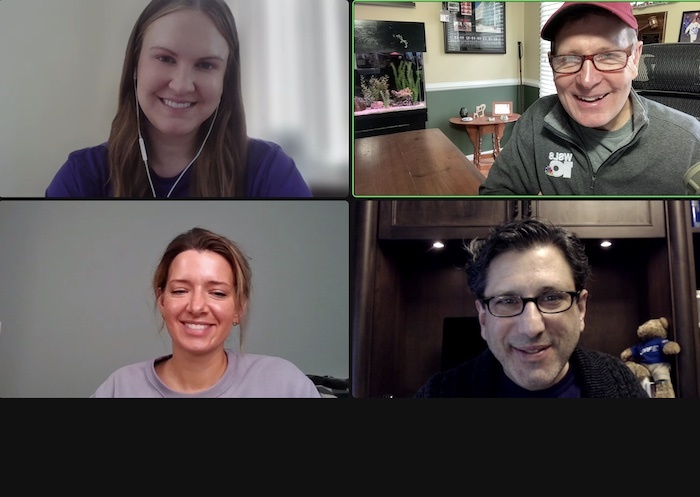
Show notes:
Sarcoidosis Awareness Month Info: https://www.stopsarcoidosis.org/standupforsarc/
More on aTyr Pharma: https://atyrpharma.com/
Participate in the aTyr Clinical Trial: https://bit.ly/3EUOxNq
aTyr News Release: https://investors.atyrpharma.com/news-releases/news-release-details/atyr-pharma-announces-dosing-first-patient-pivotal-phase-3-efzo
Attend the FSR Crystal Awards Gala: https://www.stopsarcoidosis.org/gala-2023/
Royce's Cycle4Sarc page: https://stopsarcoidosis.rallybound.org/cycle4sarc?tab=Dashboard&fbclid=PAAaa9zWEjpGVyS1Q5Swa8mm5JT0t7JH13dfxVxdW1QlBMmbiRmc00Ol-uu-c
Royce Robertsons original interview: https://beatsarc.podbean.com/e/episode-79a-royce-robertson-is-fighting-sarcoidosis-from-the-seat-of-his-bike/
Help FSR further its mission by becoming an Alliance Volunteer: www.stopsarcoidosis.org/gsca-leaders/
Become a community outreach leader: https://www.stopsarcoidosis.org/gsca-leaders/
MORE FROM JOHN
Cycling with Sarcoidosis http://carlinthecyclist.com/category/cycling-with-sarcoidosis/
Do you like the official song for the Sarc Fighter podcast? It's also an FSR fundraiser!
If you would like to donate in honor of Mark Steier and the song, Zombie, Here is a link to his KISS account. (Kick In to Stop Sarcoidosis) 100-percent of the money goes to the Foundation. https://stopsarcoidosis.rallybound.org/MarkSteier
The Foundation for Sarcoidosis Research https://www.stopsarcoidosis.org/
Donate to my KISS (Kick In to Stop Sarcoidosis) fund for FSR https://stopsarcoidosis.rallybound.org/JohnCarlinVsSarcoidosis?fbclid=IwAR1g2ap1i1NCp6bQOYEFwOELdNEeclFmmLLcQQOQX_Awub1oe9bcEjK9P1E
My story on Television https://www.stopsarcoidosis.org/news-anchor-sarcoidosis/
email me carlinagency@gmail.com
email Royce Robertson roycelrobertson@gmail.com

Monday Mar 27, 2023
Monday Mar 27, 2023
Tony Haskel is an active person. From his home in Connecticut, he makes time to ski in Vermont and ride his bike in the hilly regions around his home. But one day he found he couldn't go. His heart wasn't functioning properly because sarcoidosis had found its way into his body and started blocking vital communications within his heart itself. In this episode of the Sarc Fighter Podcast, Tony shares how sarcoidosis has attacked him and how he is fighting back.

Show notes:
More on aTyr Pharma: https://atyrpharma.com/
Participate in the aTyr Clinical Trial: https://bit.ly/3EUOxNq
aTyr News Release: https://investors.atyrpharma.com/news-releases/news-release-details/atyr-pharma-announces-dosing-first-patient-pivotal-phase-3-efzo
Attend the FSR Crystal Awards Gala: https://www.stopsarcoidosis.org/gala-2023/
Royce's Cycle4Sarc page: https://stopsarcoidosis.rallybound.org/cycle4sarc?tab=Dashboard&fbclid=PAAaa9zWEjpGVyS1Q5Swa8mm5JT0t7JH13dfxVxdW1QlBMmbiRmc00Ol-uu-c
Listen to the Kinevant Town Hall about clinical trials: https://beatsarc.podbean.com/e/bonus-episode-fsr-town-hall-uncovering-the-future-of-sarcoidosis-treatment-and-clinical-trials/
Royce Robertsons original interview: https://beatsarc.podbean.com/e/episode-79a-royce-robertson-is-fighting-sarcoidosis-from-the-seat-of-his-bike/
Help FSR further its mission by becoming an Alliance Volunteer: www.stopsarcoidosis.org/gsca-leaders/
Become a community outreach leader: https://www.stopsarcoidosis.org/gsca-leaders/
MORE FROM JOHN
Cycling with Sarcoidosis http://carlinthecyclist.com/category/cycling-with-sarcoidosis/
Do you like the official song for the Sarc Fighter podcast? It's also an FSR fundraiser!
If you would like to donate in honor of Mark Steier and the song, Zombie, Here is a link to his KISS account. (Kick In to Stop Sarcoidosis) 100-percent of the money goes to the Foundation. https://stopsarcoidosis.rallybound.org/MarkSteier
The Foundation for Sarcoidosis Research https://www.stopsarcoidosis.org/
Donate to my KISS (Kick In to Stop Sarcoidosis) fund for FSR https://stopsarcoidosis.rallybound.org/JohnCarlinVsSarcoidosis?fbclid=IwAR1g2ap1i1NCp6bQOYEFwOELdNEeclFmmLLcQQOQX_Awub1oe9bcEjK9P1E
My story on Television https://www.stopsarcoidosis.org/news-anchor-sarcoidosis/
email me carlinagency@gmail.com
email Royce Robertson roycelrobertson@gmail.com

Monday Mar 13, 2023
Monday Mar 13, 2023
Sam Wassel is a young wife and mother. She is also a long distance runner. But the hardest thing she's encountered recently is the pain in her abdomen. At first she thought it was a severe issue with her monthly cycle. But upon further review, it was sarcoidosis. Listen as she details the pain she experienced and the difficult path to diagnosis. Also in this episode, Sarc Fighter Royce Robertson returns with details about his sarc fundraiser Cycle4Sarc. He's undertaking a major bike ride -- even though he suffers from cardiac sarcoidosis to raise money for the Foundation for Sarcoidosis Research. Listen in as he talks about his plans and fundraising efforts -- and - Do you want to join him?

Sam Wassel on the FSR Sarc Fighter Podcast
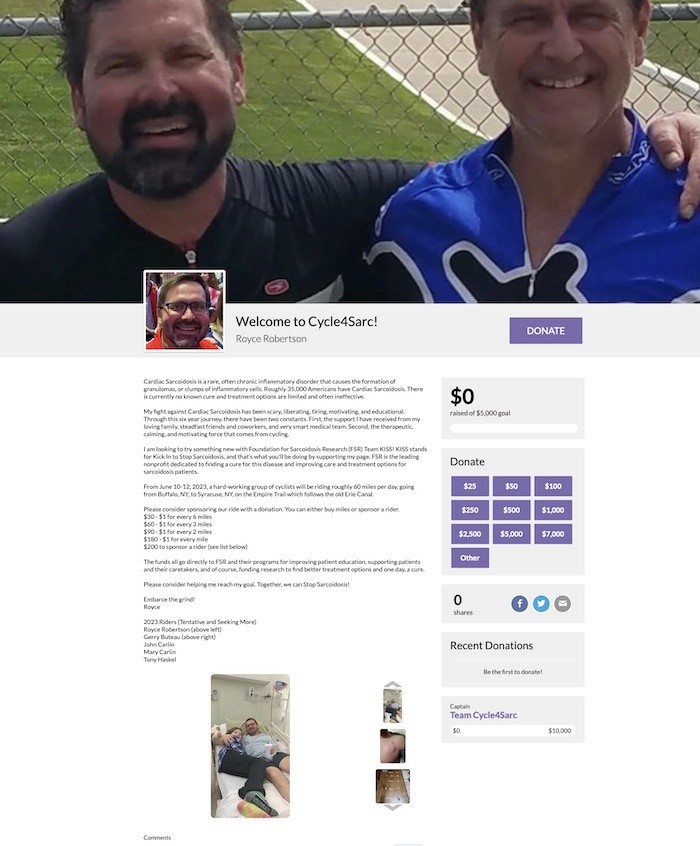
A screen grab from Royce Robertson's Fundraising Page
Show notes:
Attend the FSR Crystal Awards Gala: https://www.stopsarcoidosis.org/gala-2023/
Royce's Cycle4Sarc page: https://stopsarcoidosis.rallybound.org/cycle4sarc?tab=Dashboard&fbclid=PAAaa9zWEjpGVyS1Q5Swa8mm5JT0t7JH13dfxVxdW1QlBMmbiRmc00Ol-uu-c
Listen to the Kinevant Town Hall about clinical trials: https://beatsarc.podbean.com/e/bonus-episode-fsr-town-hall-uncovering-the-future-of-sarcoidosis-treatment-and-clinical-trials/
Royce Robertsons original interview: https://beatsarc.podbean.com/e/episode-79a-royce-robertson-is-fighting-sarcoidosis-from-the-seat-of-his-bike/
Watch the Kinevant Town Hall about clinical trials on YouTube: https://youtu.be/RTP_46gvLPU
Participate in the Kinevant Clinical Trial https://bit.ly/3DaVsR6
More about Kinevant: https://kinevant.com/about-us/
Help FSR further its mission by becoming an Alliance Volunteer: www.stopsarcoidosis.org/gsca-leaders/
Become a community outreach leader: https://www.stopsarcoidosis.org/gsca-leaders/
MORE FROM JOHN
Cycling with Sarcoidosis http://carlinthecyclist.com/category/cycling-with-sarcoidosis/
Do you like the official song for the Sarc Fighter podcast? It's also an FSR fundraiser!
If you would like to donate in honor of Mark Steier and the song, Zombie, Here is a link to his KISS account. (Kick In to Stop Sarcoidosis) 100-percent of the money goes to the Foundation. https://stopsarcoidosis.rallybound.org/MarkSteier
The Foundation for Sarcoidosis Research https://www.stopsarcoidosis.org/
Donate to my KISS (Kick In to Stop Sarcoidosis) fund for FSR https://stopsarcoidosis.rallybound.org/JohnCarlinVsSarcoidosis?fbclid=IwAR1g2ap1i1NCp6bQOYEFwOELdNEeclFmmLLcQQOQX_Awub1oe9bcEjK9P1E
My story on Television https://www.stopsarcoidosis.org/news-anchor-sarcoidosis/
email me carlinagency@gmail.com
email Royce Robertson roycelrobertson@gmail.com

Monday Mar 06, 2023
Monday Mar 06, 2023
This is a special bonus episode of the FSR Sarc Fighter podcast. You will be listening to a town hall recorded on February 18, 2023, where the guests discuss how to get more people involved in clinical trials for medications pointed at treating sarcoidosis patients.
Guests include Mary McGowan CEO of the Foundation for Sarcoidosis Research, Dr. Divya Patel Director of Sarcoidosis and ILD programs at the University of Florida, Bill Gerhart, CEO of Kinevant Sciences inc., And Garrie Farrow FSR Patient Advocate and Women of Color committee member. FSR Sarc Fighter podcast host John Carlin served as moderator.
During the hour-long presentation, the need for clinical trials in order to advance the fight against sarcoidosis is clearly laid out -- as is the difficulty in recruiting patients for the program and the reasons many patients decline to participate.
All of this with the goal of making it easier for patients to say yes and for medical science to help make it easier for patients to participate.
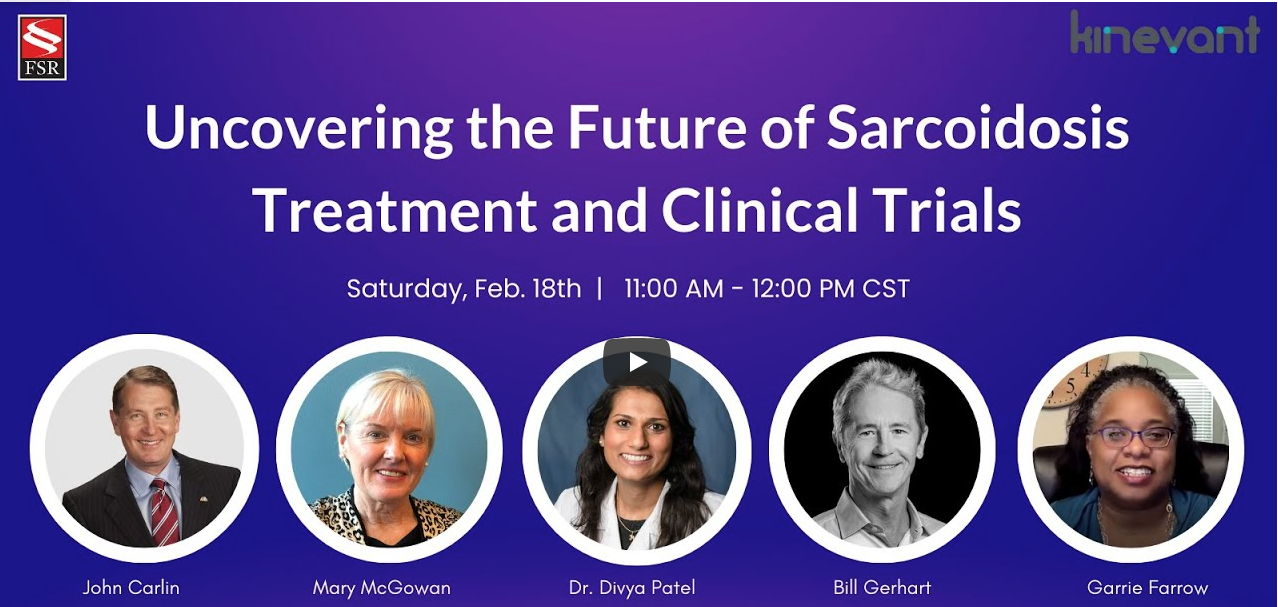
Show notes
Watch the Town Hall on YouTube: https://youtu.be/RTP_46gvLPU
Kinevant Clinical Trial https://bit.ly/3DaVsR6
More about Kinevant: https://kinevant.com/about-us/
Help FSR further its mission by becoming an Alliance Volunteer: www.stopsarcoidosis.org/gsca-leaders/
Become a community outreach leader: https://www.stopsarcoidosis.org/gsca-leaders/
Webinar on becoming an Alliance Volunteer: https://www.eventbrite.com/e/becoming-an-fsr-global-sarcoidosis-clinic-alliance-volunteer-leader-tickets-445588847237
MORE FROM JOHN
Cycling with Sarcoidosis http://carlinthecyclist.com/category/cycling-with-sarcoidosis/
Do you like the official song for the Sarc Fighter podcast? It's also an FSR fundraiser!
If you would like to donate in honor of Mark Steier and the song, Zombie, Here is a link to his KISS account. (Kick In to Stop Sarcoidosis) 100-percent of the money goes to the Foundation. https://stopsarcoidosis.rallybound.org/MarkSteier
The Foundation for Sarcoidosis Research https://www.stopsarcoidosis.org/
Donate to my KISS (Kick In to Stop Sarcoidosis) fund for FSR https://stopsarcoidosis.rallybound.org/JohnCarlinVsSarcoidosis?fbclid=IwAR1g2ap1i1NCp6bQOYEFwOELdNEeclFmmLLcQQOQX_Awub1oe9bcEjK9P1E
My story on Television https://www.stopsarcoidosis.org/news-anchor-sarcoidosis/
email me carlinagency@gmail.com
email Royce Robertson roycelrobertson@gmail.com

Monday Feb 20, 2023
Episode 81 | Wade Tomlinson tries to walk away from sarcoidosis.
Monday Feb 20, 2023
Monday Feb 20, 2023
Wade Tomlinson is a relatively young 49 years old - and he's already been suffering from sarcoidosis for nine years. Despite his reduced ability to breathe, he hits the trails every day, where he tried to log 15,000 steps. Sometimes even more. In Episode 81 he tells john how sarcoidosis crept up on him, somewhat disguised as allergies.

Show Notes:
More on aTyr Pharma: https://atyrpharma.com/
Participate in the aTyr Clinical Trial: https://bit.ly/3EUOxNq
aTyr News Release: https://investors.atyrpharma.com/news-releases/news-release-details/atyr-pharma-announces-dosing-first-patient-pivotal-phase-3-efzo
Volunteer for the FSR Global Clinical Alliance! www.stopsarcoidosis.org/gsca-leaders/
#Makeitvisible https://www.stopsarcoidosis.org/fsr-updates-and-publications/
Eat Better and Fight Sarc: Nourish by Lindsey: https://www.nourishbylindsey.com/
Wade's medicine OFEV: https://www.ofev.com/
MORE FROM JOHN
Cycling with Sarcoidosis http://carlinthecyclist.com/category/cycling-with-sarcoidosis/
Do you like the official song for the Sarc Fighter podcast? It's also an FSR fundraiser!
If you would like to donate in honor of Mark Steier and the song, Zombie, Here is a link to his KISS account. (Kick In to Stop Sarcoidosis) 100-percent of the money goes to the Foundation. https://stopsarcoidosis.rallybound.org/MarkSteier
The Foundation for Sarcoidosis Research https://www.stopsarcoidosis.org/
Donate to my KISS (Kick In to Stop Sarcoidosis) fund for FSR https://stopsarcoidosis.rallybound.org/JohnCarlinVsSarcoidosis?fbclid=IwAR1g2ap1i1NCp6bQOYEFwOELdNEeclFmmLLcQQOQX_Awub1oe9bcEjK9P1E
My sarcoidosis story on Television https://www.stopsarcoidosis.org/news-anchor-sarcoidosis/
email me carlinagency@gmail.com

Monday Feb 06, 2023
Monday Feb 06, 2023
In Episode 80 of the Sarc Fighter podcast, we take it too sarcoidosis in two ways -- by learning how to join an important clinical trial and by living the fullest life we can despite the challenges sarcoidosis presents.
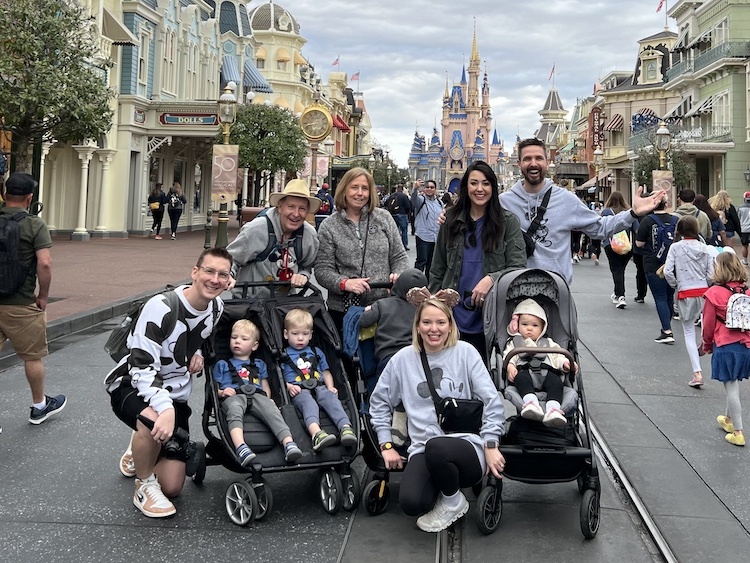
Show Notes
Kinevant Clinical Trial https://bit.ly/3DaVsR6
More about Kinevant: https://kinevant.com/about-us/
Help FSR further its mission by becoming an Alliance Volunteer: www.stopsarcoidosis.org/gsca-leaders/
Become s community outreach leader: https://www.stopsarcoidosis.org/gsca-leaders/
Webinar on becoming an Alliance Volunteer: https://www.eventbrite.com/e/becoming-an-fsr-global-sarcoidosis-clinic-alliance-volunteer-leader-tickets-445588847237
MORE FROM JOHN
Cycling with Sarcoidosis http://carlinthecyclist.com/category/cycling-with-sarcoidosis/
Do you like the official song for the Sarc Fighter podcast? It's also an FSR fundraiser!
If you would like to donate in honor of Mark Steier and the song, Zombie, Here is a link to his KISS account. (Kick In to Stop Sarcoidosis) 100-percent of the money goes to the Foundation. https://stopsarcoidosis.rallybound.org/MarkSteier
The Foundation for Sarcoidosis Research https://www.stopsarcoidosis.org/
Donate to my KISS (Kick In to Stop Sarcoidosis) fund for FSR https://stopsarcoidosis.rallybound.org/JohnCarlinVsSarcoidosis?fbclid=IwAR1g2ap1i1NCp6bQOYEFwOELdNEeclFmmLLcQQOQX_Awub1oe9bcEjK9P1E
My story on Television https://www.stopsarcoidosis.org/news-anchor-sarcoidosis/
email me carlinagency@gmail.com
email Royce Robertson roycelrobertson@gmail.com
